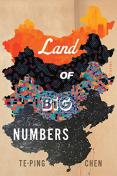
by Te-Ping Chen
Kindle Edition- $9.99
Click on the ORANGE Amazon Button for Book Description & Pricing Info
Overall rating:
How would you rate this book?
Member ratings
Land of Big Numbers, Te-Ping Chen author
In this book of short stories, the author has painted a broad picture of China, a country that sometimes subtly and sometimes overtly controls the lives of all its citizens. The stories illuminate life in China and life for the Chinese immigrant in America. Each tale is very unique. With a spare prose that needs no embellishment, each story fully develops and defines its main character as it shows the behavior that results from the brainwashing inculcated into the citizens in their daily lives. From the stories one gets the idea that many of the Chinese acquiesce as they succumb to something akin to the Stockholm Syndrome!
“Lulu” takes place in Beijing. The issue of one child per family is explored when a family is lucky enough to have twins. From there, the idea of the favorite child is tackled as the dreams of the parents are attached to one of them. Civil unrest that develops from the lack of freedom of choice and the regimented way of life allowing only for one set of ideas disrupts the country and the family.
In “Hotline Girls”, the theme illustrates the hopes and dreams of the young in China and the consequences they face if they fail. The reader learns how the workplace in China is controlled. The reader sees the development of personalities that grow from the strict discipline, coupled with the fear that accompanies their need to achieve or else face retribution which could affect their entire future. Poor performance is unacceptable. There is little room for dissent of any kind at work or in the political scene. Freedom has many meanings.
“New Fruit” is about a great tasting treat, a fruit that seems to make the eater more positive, more apt to help others, to like others and to be inspired to fulfill their dreams. Different behavior is motivated depending on the person’s personality, but the pattern was positive. When a crop is grown that does the opposite, that makes people feel guilty and remorseful for their past behavior, their shame makes them resentful and they become depressed, rude and selfish, reverting to their former selves. Can the government allow this?
In “The Flying Machine”, the resourcefulness and entrepreneurial spirit of the Chinese citizen is highlighted. An inventor who wants to join the Communist Party, but is always refused, never loses hope and keeps trying even after his many failures. Does he have hope for a reward someday? What gives him the hope?
“On The Street Where You Live” illustrates the consequences of compulsive and impulsive behavior. It exposes the way the jealous and suspicious mind works, always thinking someone has an ulterior motive, always finding it difficult to trust someone. The inability to accept responsibility for one’s one behavior and to face the truth about their own actions comes from the overriding atmosphere in China of mistrust.
In “Shanghai murmur”, a young woman, dissatisfied with her life, leaves home at 16 and runs away to Shanghai. She works odd jobs, never making much progress. In the flower shop she now works, her imagination about her feelings for a man who makes frequent purchases is her ruination. Because she covets his pen, her world collapses, but she is resilient, making excuses for her wicked behavior and does not repent. Has she learned anything from her mistakes or is her personality already irrevocably formed?
In the story with the book’s title, “Land of Big Numbers”, dreams of wealth and power cause a man to take foolhardy risks. Does he accept responsibility for his foolish choices? Is rebellion worthwhile? In a country which allows for little economic mobility and for no political activism against their policies, there is little hope for advancement. How does one survive?
In “Beautiful Country”, a young couple is on a trip. They have been involved for almost a decade, and still there is no marriage proposal. Should she believe his promises or his excuses? Is he faithful? She is a nurse living in America, but her personality has been nurtured in China.
“Gubeiku Spirit” is the most unusual story. Trapped in a train station, being held hostage by the government, the victims are at first patient, then they bicker, then they adapt and form a working community. Have they been so beaten down by propaganda that they cannot escape?
This author has captured the personality cultivated by an authoritarian government of obedience and acquiescence, always finding a reason to accept their plight and to tolerate the situation. It is about ordinary citizens who accede to authority, trusting them to provide for their lot in life. Even when they are unhappy, they adapt because what other choice do they really have? The characters are flawed, but flawed by the lives they are forced to lead. They are victims of their own poor choices, often made out of a sense of hopelessness because of the heavy hand of the government. The people that populate the stories seem totally authentic. This author has a gift for capturing memorable and emotional moments, of eliciting the human rights abuses and of providing examples of the character’s submission to circumstances, in each story. The characters are all flawed, all unable to recognize their bad choices, they simply move on.
Book Club HQ to over 90,000+ book clubs and ready to welcome yours.
Get free weekly updates on top club picks, book giveaways, author events and more








